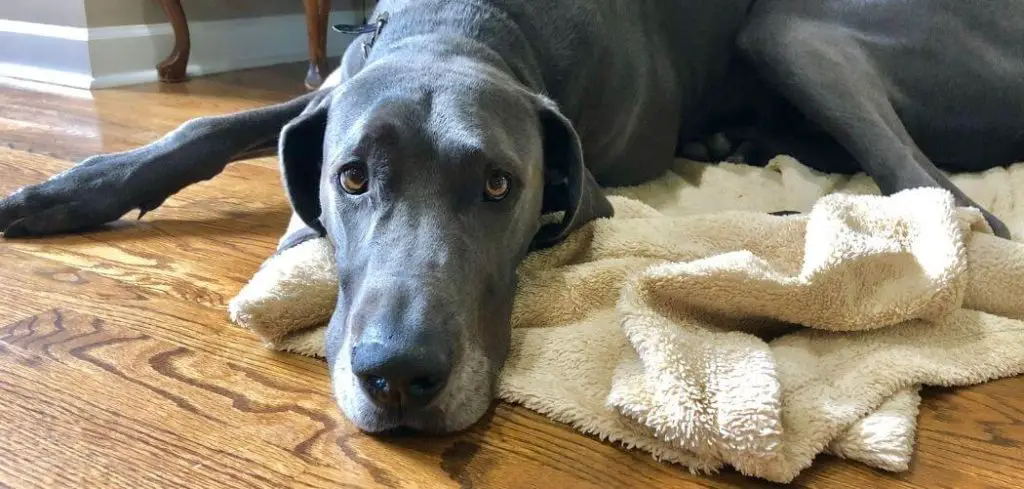Excessive panting after surgery can be alarming for dog owners, especially when combined with discomfort or restlessness.
Whether your dog is recovering at home or still under observation, heavy panting can signal pain, stress, or complications.
We outline the common causes of a dog panting excessively after surgery, what you can do at home, and when to seek veterinary help.
Dog Panting Excessively After Surgery — Why It Happens
Panting after surgery is often a normal part of recovery, but sometimes it points to deeper issues. Anesthesia, pain, anxiety, or an underlying complication can all contribute.
Dogs may pant if they’re in pain, struggling with nausea, feeling disoriented, or running a fever. In some cases, panting can be a red flag for serious conditions like internal bleeding or infection.

Common Causes of Dog Panting Excessively After Surgery
Pain and Discomfort
Panting is one of the most common signs of pain in dogs. After surgery, your dog may experience pain at the incision site or from internal inflammation.
Even if pain medications were given, they may wear off or be insufficient.
Look for other signs like whining, pacing, or licking the surgical area.
Managing pain effectively is key to your dog’s recovery and comfort.
Read more: Dog Panting Excessively and Restless (What it means)
Effects of Anesthesia
The lingering effects of anesthesia can affect your dog’s breathing and behavior.
Panting may occur as the body metabolizes the drugs used during surgery. Some dogs react with confusion, agitation, or disorientation during this recovery window.
This typically improves within 24–48 hours but should still be monitored closely.
Postoperative Anxiety or Stress
Hospital stays, strange environments, and physical discomfort can make dogs anxious.
Stress-related panting is common after surgery, especially if your dog is normally sensitive or fearful.
You might also see pacing, trembling, or seeking constant reassurance from you.
Providing a calm, quiet recovery space helps ease emotional stress.
Infection or Fever
A fever from a postoperative infection can cause your dog to pant excessively.
If bacteria enter the surgical site, the immune response triggers inflammation and elevated body temperature.
Check for swelling, redness, heat, or discharge at the incision site, along with reduced appetite or lethargy.
Prompt veterinary care is needed to treat infections.
Internal Bleeding
Though rare, internal bleeding is a serious complication after surgery.
It can cause panting due to low blood pressure and internal pain. Other signs include pale gums, weakness, or a distended abdomen.
If you suspect internal bleeding, seek emergency veterinary care immediately.
Read more: Dog Panting Excessively (Here’s why)
Nausea or Digestive Upset
Some dogs experience nausea after anesthesia or when starting pain medications.
Panting may occur alongside drooling, lip licking, or vomiting.
Your vet may adjust medications or recommend an anti-nausea treatment to ease symptoms.
What to Do If Your Dog Is Panting Excessively After Surgery
Make sure your dog is resting in a quiet, comfortable environment away from noise or other pets. Keep the room cool and well-ventilated.
Monitor the surgical site daily for signs of infection such as redness, discharge, or swelling.
Stick to the pain management and medication plan your vet provided. Never give human medications unless specifically prescribed.
Use an e-collar to prevent licking or biting at the incision area, which can lead to infection or reopening of stitches.
Offer water and small meals, but avoid overfeeding if your dog seems nauseated. If they’re not eating at all, call your vet.
When to Call or Visit Your Vet
Panting that seems excessive, constant, or worsens after 24–48 hours post-surgery should be taken seriously.
Call your vet if your dog:
Has pale gums or seems weak
Is panting and refusing to lie down or rest
Shows signs of pain despite medication
Has a swollen, hot, or leaking incision site
Is vomiting, not eating, or acting lethargic
These could point to complications like infection, pain mismanagement, or more serious concerns.
Read more: Dog Panting Excessively at Night (How to tell if it’s an emergency)
Key Takeaway
Panting after surgery isn’t always cause for panic—but it does mean you should stay alert.
Mild panting can be part of a normal healing process, but excessive or persistent panting may signal pain, infection, or a more serious complication.
Keep your dog comfortable, follow all post-op care instructions, and never hesitate to call your vet if something seems off. Your attentiveness makes all the difference in a smooth recovery.
